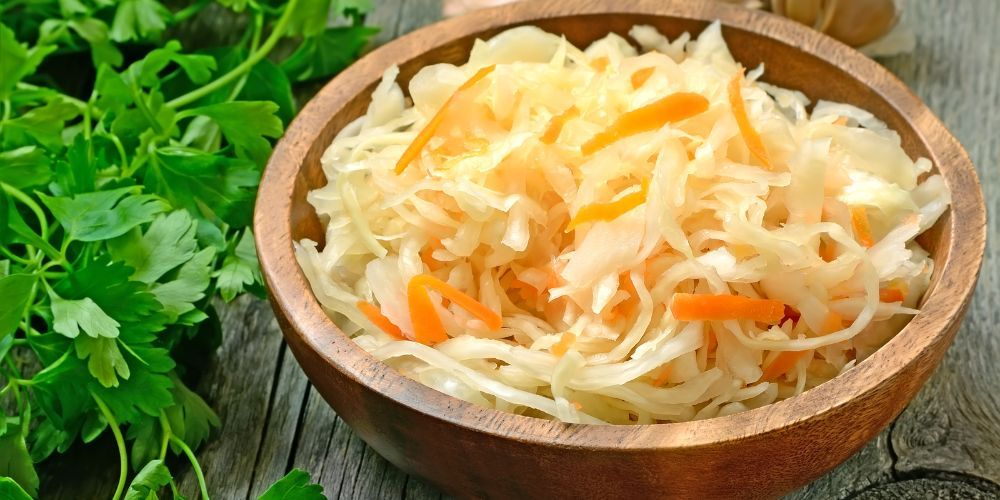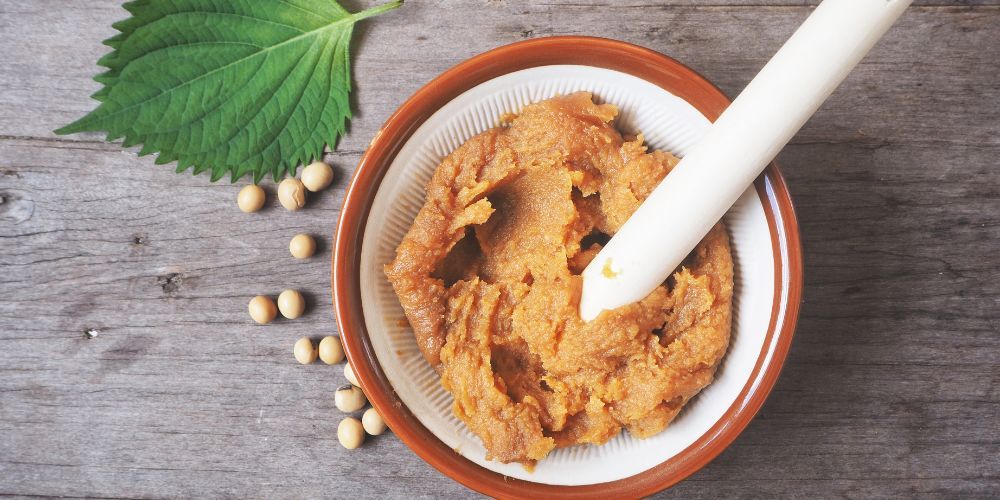Best Fermented Food: The Top Picks for a Healthy Gut

Fermented foods are not only a delicious addition to any meal, but they also have multiple health benefits.
These foods are made using natural processes that involve the breakdown of carbohydrates and sugars by bacteria and yeast.
The result is a food that is rich in probiotics, which are beneficial bacteria that can improve gut health and boost the immune system.
There are many different types of fermented foods, ranging from traditional favorites like yogurt and sauerkraut to newer creations like kombucha and kimchi.
Each of these foods has its own unique flavor and texture, making them a versatile addition to any diet. In addition to their potential health benefits, fermented foods are also a great way to add variety and interest to meals.
What are Fermented Foods?
Fermented foods are foods that have undergone a natural process called fermentation, which involves the breakdown of carbohydrates by microorganisms such as yeast and bacteria.
This process results in the production of beneficial compounds such as probiotics, vitamins, and antioxidants.
Fermentation Process
The fermentation process involves the conversion of sugars and other carbohydrates into alcohol or organic acids.
This process is carried out by microorganisms such as yeast and bacteria, which consume the sugars and produce various compounds as by-products.
During fermentation, the microorganisms produce enzymes that break down the carbohydrates into simpler compounds, which are then further metabolized into alcohol or organic acids.
This process can take anywhere from a few hours to several months, depending on the type of food and the specific microorganisms involved.

Types of Fermented Foods
There are many different types of fermented foods, including:
- Yogurt and kefir
- Sauerkraut and kimchi
- Kombucha and other fermented drinks
- Miso and tempeh
- Pickles and other fermented vegetables
- Cheese and other fermented dairy products
Each of these foods undergoes a slightly different fermentation process, which results in unique flavors, textures, and nutritional profiles.
Nutrients and Antioxidants
Fermented foods are rich in a variety of nutrients and antioxidants, including probiotics, vitamins, and minerals. Probiotics are beneficial bacteria that help to support a healthy gut microbiome, which is important for overall health and well-being.
In addition to probiotics, fermented foods also contain a variety of vitamins and minerals, including vitamin K2, which is important for bone health, and various B vitamins, which are important for energy production and brain function.
Finally, fermented foods are also rich in antioxidants, which help protect the body against oxidative stress and inflammation. These compounds also promote digestive health and may have anti-aging properties.
Health Benefits of Fermented Foods
Fermented foods have been a part of human diets for centuries, and they offer a wide range of health benefits. Here are some of the key benefits of consuming fermented foods:
Gut Health
Fermented foods are rich in probiotics, which are live microorganisms that are beneficial for our digestive system. These probiotics help to maintain a healthy balance of gut bacteria, which is essential for optimal digestion and nutrient absorption. They can also help to alleviate symptoms of digestive disorders such as irritable bowel syndrome (IBS) and inflammatory bowel disease (IBD).
According to a study published in the journal Nutrients, consuming fermented foods can improve gut health by reducing inflammation, improving gut barrier function, and increasing the diversity of gut microbiota.
In addition to probiotics, fermented foods are also a good source of fiber, which is important for maintaining a healthy gut. Fiber helps to promote regular bowel movements and can also reduce the risk of colon cancer.
Immune Health
Fermented foods can also help boost our immune system. The probiotics found in fermented foods help stimulate the production of antibodies, which are proteins that help fight harmful pathogens such as bacteria and viruses.
A study published in the journal Frontiers in Microbiology found that consuming fermented foods can help increase the production of cytokines, which are proteins that regulate the immune system.
In addition to probiotics, fermented foods are also a good source of nutrients such as antioxidants, vitamins, and minerals. These nutrients help support our immune system and protect our cells from damage caused by free radicals.
Mental Health
Research has shown that there is a strong connection between our gut and our brain, and consuming fermented foods can help improve our mental health. The probiotics found in fermented foods help reduce inflammation in the body, which has been linked to depression and anxiety.
Fermented foods also contain bioactive peptides, which are proteins that have a positive effect on our mood and cognitive function. These peptides can help to reduce stress and improve our overall sense of well-being.
A study published in the journal Journal of Psychiatric Research found that consuming fermented foods can reduce symptoms of depression and anxiety.
Another study published in the journal Nutrients found that consuming fermented foods can improve cognitive function.

Popular Fermented Foods
Yogurt
Yogurt is one of the most popular fermented foods in the world. It is made by fermenting milk with bacteria, usually Lactobacillus bulgaricus and Streptococcus thermophilus.
These bacteria convert lactose, the natural sugar in milk, into lactic acid, which gives yogurt its tangy flavor and thick texture.
Yogurt is a good source of protein, calcium, and probiotics, which are beneficial bacteria that can improve gut health.
Kimchi
Kimchi is a spicy Korean side dish made from fermented vegetables, usually napa cabbage, radish, and scallions, seasoned with chili pepper, garlic, ginger, and fish sauce.
Kimchi is rich in vitamins, minerals, and antioxidants, and it has been linked to lower cholesterol, blood pressure, and inflammation.
Kimchi is also versatile and can be eaten as a snack, a condiment, or a main dish.
Kombucha
Kombucha is a fermented beverage made from sweetened black tea and a SCOBY (symbiotic culture of bacteria and yeast).
The SCOBY consumes the sugar and caffeine in the tea and produces carbon dioxide, alcohol, and acetic acid, which give kombucha its effervescence, tanginess, and slight alcohol content.
Kombucha is a good source of probiotics, antioxidants, and organic acids, which can boost immunity, digestion, and energy.
Sauerkraut
Sauerkraut is a German dish made from fermented cabbage, salt, and water.
The lactobacilli bacteria in the cabbage convert the sugars in the cabbage into lactic acid, which preserves the cabbage and gives it a sour taste.
Sauerkraut is low in calories, high in fiber, and rich in vitamin C and K. It is also a good source of probiotics, which can improve digestion and immune function.
Miso
Miso is a Japanese seasoning made from fermented soybeans, salt, and koji (a type of fungus).
The fermentation process can take anywhere from a few days to several years, depending on the type of miso.
Miso is a good source of protein, fiber, and probiotics, and it has a salty, savory, and slightly sweet flavor. It can be used in soups, marinades, dressings, and sauces.

Tempeh
Tempeh is a traditional Indonesian food made from fermented soybeans that have been pressed into a cake.
The fermentation process binds the soybeans together and creates a nutty, earthy, and slightly tangy flavor.
Tempeh is a good source of protein, fiber, and probiotics, and it can be used in stir-fries, salads, sandwiches, and burgers.
Pickles
Pickles are cucumbers that have been soaked in brine, vinegar, or whey and left to ferment for several days or weeks.
The fermentation process gives pickles their sour, salty, and crunchy taste.
Pickles can be made with different spices and herbs, such as dill, garlic, and mustard seeds.
They are low in calories, high in fiber, and a good source of vitamin K and electrolytes.
Making Fermented Foods at Home
Equipment and Ingredients
Making homemade fermented foods is a great way to support a healthy gut microbiome. To get started, you'll need some basic equipment and ingredients. Here are some essentials:
- Mason jars or other glass containers
- Filtered water
- Sea salt or other non-iodized salts
- Starter cultures (you can buy different starter cultures depending on the food you want to ferment like sourdough bread, yogurt, kefir, Kombucha, cheese, or others)
- Fresh vegetables, fruits, or other fermentable foods
You can find most of these items at your local grocery store, health food store, or online. Look for starter cultures in the refrigerated section or ask a store employee for help.
Recipes
Once you have your equipment and ingredients, it's time to start fermenting! Here are a few simple recipes to get you started:
Sauerkraut
Ingredients:
- 1 head of cabbage, shredded
- 2-3 carrots, grated
- 1 tablespoon sea salt
Instructions:
- Combine the cabbage, carrots, and salt in a bowl and massage them very well
- Pack your mix into a mason jar, pressing down to release any air bubbles.
- Place a lid on the jar and let sit at room temperature for 3-7 days, or until the desired level of sourness is reached.
- Transfer sauerkraut to the refrigerator to stop the fermentation process. It will keep for several months.
Kombucha

Ingredients:
- 1 SCOBY (symbiotic culture of bacteria and yeast)
- 1 cup organic sugar
- 8 bags of black tea
- Filtered water
Instructions:
- Boil 4 cups of filtered water and steep tea bags for 5-7 minutes. Remove tea bags and add sugar, stirring until dissolved.
- Let the tea cool to room temperature, then pour it into a large glass jar.
- Add SCOBY and enough filtered water to fill the jar, leaving about 1 inch of headspace.
- Cover the jar with a cloth or coffee filter and secure it with a rubber band.
- Let sit at room temperature for 7-14 days, or until desired level of sweetness and carbonation is reached.
- Transfer the kombucha to the refrigerator to stop the fermentation process. It will keep for several weeks.
Tips
Here are a few tips to help you get the most out of your homemade fermented foods:
- Use clean, sterilized equipment to avoid contamination.
- Keep fermented foods away from direct sunlight and extreme temperatures.
- Experiment with different vegetables, fruits, and spices to create unique flavor combinations.
- Start with small batches until you get the hang of the process.
- Check your fermented foods regularly for signs of spoilage, such as mold or bad smells.
Making naturally fermented foods at home is a fun and rewarding way to support your health. With a little practice and experimentation, you'll soon be a fermentation pro!


